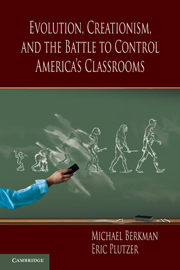Book contents
- Frontmatter
- Contents
- Figures
- Tables
- Acknowledgments
- Introduction
- 1 Who Should Decide What Children Are Taught?
- 2 The Public Speaks: “Teach Both”
- 3 A Nation Divided by Religion, Education, and Place
- 4 Is Evolution Fit for Polite Company? Science Standards in the American States
- 5 Teachers and What They Teach
- 6 State Standards Meet Street-Level Bureaucracy
- 7 When the Personal Becomes Pedagogical
- 8 Teachers in Their Schools and Communities
- 9 The Battle for America’s Classrooms
- Appendix to Chapter 2
- Appendix to Chapter 3
- Appendix to Chapter 4
- Appendix to Chapter 5
- Appendix to Chapter 6
- References
- Judicial Opinions and Court Cases Cited
- Index
7 - When the Personal Becomes Pedagogical
Published online by Cambridge University Press: 05 June 2012
- Frontmatter
- Contents
- Figures
- Tables
- Acknowledgments
- Introduction
- 1 Who Should Decide What Children Are Taught?
- 2 The Public Speaks: “Teach Both”
- 3 A Nation Divided by Religion, Education, and Place
- 4 Is Evolution Fit for Polite Company? Science Standards in the American States
- 5 Teachers and What They Teach
- 6 State Standards Meet Street-Level Bureaucracy
- 7 When the Personal Becomes Pedagogical
- 8 Teachers in Their Schools and Communities
- 9 The Battle for America’s Classrooms
- Appendix to Chapter 2
- Appendix to Chapter 3
- Appendix to Chapter 4
- Appendix to Chapter 5
- Appendix to Chapter 6
- References
- Judicial Opinions and Court Cases Cited
- Index
Summary
It is the teacher's business to decide what to teach. It is not the business of the federal courts nor the state.
John Thomas Scopes (1970)Once you get into the classroom…the teacher is going to teach whatever she or he really thinks.
Supreme Court Justice Lewis Powell (1987)Despite the intensity that often accompanies the formulation of state standards, Chapter 6 offers strong evidence that standards exert only limited control over what high school biology teachers actually do in the classroom. Yet, if standards do not explain the substantial differences among teachers both in the time they devote to evolutionary biology and their emphases while teaching it, what does? Two factors we examined in the previous chapter – teachers’ seniority and their self-rated expertise in the subject matter – suggest that it is their personal and professional characteristics that may provide much of the answer.
In this chapter, we will explore two facets of teachers’ personal characteristics. First, we will examine their formal teaching credentials: Do their college majors, their formal coursework in biology, or their type of teaching certification help explain their classroom approach to evolution and creationism? Second, we will see whether Justice Powell was correct in suggesting that “the teacher is going to teach whatever she or he really thinks.” Do teachers’ personal beliefs about human origins play a major role in determining teacher choices in the classroom? Our survey of high school biology teachers allows us to answer both questions about what students learn when teachers decide.
- Type
- Chapter
- Information
- Publisher: Cambridge University PressPrint publication year: 2010



